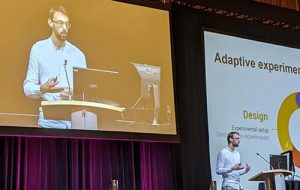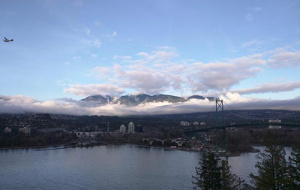AI research at NeurIPS 2019
 Old Members’ Trust Graduate Travel Fund Report – Adam Foster
Old Members’ Trust Graduate Travel Fund Report – Adam Foster
In December 2019 I was fortunate enough to travel to Vancouver to present my work at the Conference on Neural Information Processing Systems (NeurIPS) with the generous support of the Univ Old Members’ Trust. NeurIPS is a major conference in the field of artificial intelligence and machine learning. For me, it was a great opportunity to feel the pulse of my own research area – listening to world experts, meeting researchers whose work I know, witnessing the sheer scale of AI research today, and sharing my own work and ideas with a big audience. It was also a chance to see old friends and visit Canada for the first time.
The conference was held in the Vancouver Convention Center which juts out into Vancouver Harbour and, when the clouds chanced to part, provided beautiful views of Grouse Mountain which lies to the north of the city. The field of AI has grown tremendously in the last decade and that was visibly reflected in the sheer scale of the conference: it was attended by roughly 13,000 people; almost 7000 papers were submitted to the conference, with 1428 accepted including 19 from my research group in Oxford. The conference seemed never to sleep. When there was not a talk on, there was a poster session with a few hundred posters, or there was someone who wanted to grab coffee and discuss the connection between their work and mine, or there was a workshop on a niche but emerging subfield of AI. It was both exhilarating and, at times, overwhelming.
NeurIPS is considered the place to go to find out what is happening in AI. One question that seemed to be occupying many minds was: How do we train good quality models with less training data? Current machine learning models can give very good results, for example they can recognise objects in images as well as humans can; but they require a huge amount of labelled examples to learn from. In his keynote speech at the conference, Yoshau Bengio connected this to a failure to learn high-level representations of objects, including representations that understand cause and effect.
The work I was presenting at the conference was about a slightly different question. What if we start without any training data, and have to obtain it by interacting with the environment by conducting experiments? As we learn more about the system, we can refine the kinds of experiments that we conduct so that we continue to learn. In my spotlight presentation, I began by explaining this problem using the example of a psychology study, before outlining our method to estimate which experiments are likely to lead to a large gain in information.
 Vancouver was a beautiful city – many of the nearby towns can only be reached by boat or seaplane and it definitely felt like we were at the edge of the wilderness. I made time to hike with some friends just north of the city at Quarry Rock and to sample the phenomenal Korean food.
Vancouver was a beautiful city – many of the nearby towns can only be reached by boat or seaplane and it definitely felt like we were at the edge of the wilderness. I made time to hike with some friends just north of the city at Quarry Rock and to sample the phenomenal Korean food.
Many thanks to the Old Members’ Trust, as well as the NeurIPS student travel award and the EPSRC for allowing me to present my work and enjoy the conference.
Find out more about the range of travel grants and scholarships available to assist Univ students on our Travel Grants page or read further travel reports.
Published: 23 June 2020
